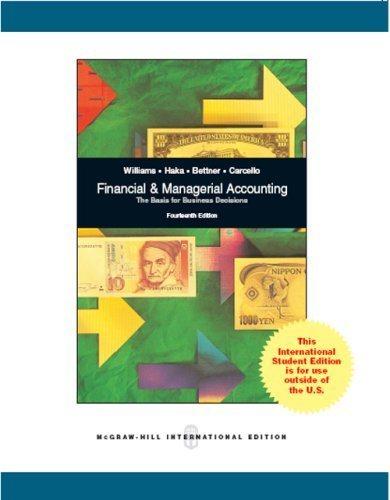Among the transactions of Beeler, Inc., were the following: a. Made payments on accounts payable to merchandise
Question:
a. Made payments on accounts payable to merchandise suppliers.
b. Paid the principal amount of a note payable to First Bank.
c. Paid interest charges relating to a note payable to First Bank.
d. Issued bonds payable for cash; management plans to use this cash in the near future to expand manufacturing and warehouse capabilities.
e. Paid salaries to employees in the finance department.
f. Collected an account receivable from a customer.
g. Transferred cash from the general bank account into a money market fund.
h. Used the cash received in d, above, to purchase land and a building suitable for a manufacturing facility.
i. Made a year-end adjusting entry to recognize depreciation expense.
j. At year-end, purchased for cash an insurance policy covering the next 12 months.
k. Paid the quarterly dividend on preferred stock.
l. Paid the semiannual interest on bonds payable.
m. Received a quarterly dividend from an investment in the preferred stock of another corporation.
n. Sold for cash an investment in the preferred stock of another corporation.
o. Received cash upon the maturity of an investment in cash equivalents. (Ignore interest.)
Instructions
Most of the preceding transactions should be included among the activities summarized in a statement of cash flows. For each transaction that should be included in this statement, indicate whether the transaction should be classified as an operating activity, an investing activity, or a financing activity.
If the transaction should not be included in the current year’s statement of cash flows, briefly explain why not. (Assume that net cash flows from operating activities are determined by the direct method.)
Accounts Payable
Accounts payable (AP) are bills to be paid as part of the normal course of business.This is a standard accounting term, one of the most common liabilities, which normally appears in the balance sheet listing of liabilities. Businesses receive... Dividend
A dividend is a distribution of a portion of company’s earnings, decided and managed by the company’s board of directors, and paid to the shareholders. Dividends are given on the shares. It is a token reward paid to the shareholders for their... Maturity
Maturity is the date on which the life of a transaction or financial instrument ends, after which it must either be renewed, or it will cease to exist. The term is commonly used for deposits, foreign exchange spot, and forward transactions, interest...
Fantastic news! We've Found the answer you've been seeking!
Step by Step Answer:
Related Book For 

Financial And Managerial Accounting
ISBN: 12
14th International Edition
Authors: Jan R. Williams, Joseph V. Carcello, Mark S. Bettner, Sue Haka, Susan F. Haka
Question Posted:





